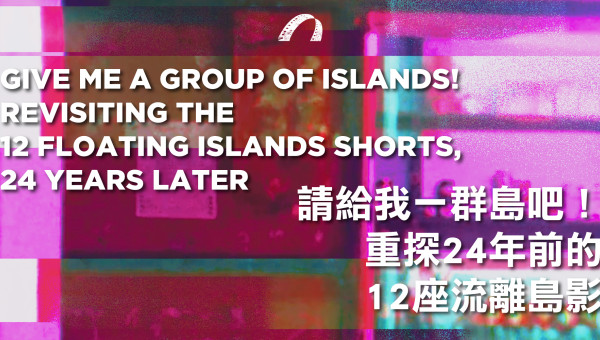REDISCOVER THE FLOATING ISLANDS
The Floating Islands film project originated from the idea of director Zero Chou, the mastermind, who wanted to shoot on the outlying islands of Taiwan. She and a group of like-minded filmmakers—some were colleagues in the same production company, while others she had worked with on different projects—exchanged ideas in a lively gathering. With a burst of enthusiasm, they decided to put their thoughts into action. In the detailed discussions that followed, the group gradually reached a consensus and invited 12 directors to assist each other in completing this significant and ground-breaking film project. These 12 directors later achieved success as filmmakers, academic researchers, or film educators. Looking back at these 12 works after 24 years, one can easily discern traces of the influence that the experiences from this project had on their careers in visual arts.
Back in 1999, it was a time when ‘documentary’ had yet to carry multiple definitions in Taiwan. The directors, however, saw abundant possibilities in their project. But with limited resources, they had to realise their boundless creative vision with careful budget planning. Besides tirelessly looking for organisations willing to help out financially, many filmmakers, due to limited conditions, came up with a mix-and-match ‘aesthetics of poverty’. Particularly when faced with the islands they chose (or were assigned to), everyone attempted to break the conventions of documentary filmmaking, striving to shed light on different aspects of the islands amidst the uncertainties of film production.
The point of departure may have been fueled by a sense of recklessness and bravery, but these works document the filmmakers’ own confusion or clarity, along with the socio-political circumstances of Taiwan at that time. They also preserve certain spirit and body gestures amid cultural disappearance or transformation. The filmmakers capture the world that once existed in the images, leaving behind vivid footnotes. The tangible and intangible states documented in these films also unexpectedly depict the contours of Taiwanese self-identification and territorial boundaries at that time. The Floating Islands project was originally named ‘Developing the outlying islands' images’, referring to the process of film developing as a metaphor for the images and consciousness of these islands gradually emerging in the frames.
A quick review of the evolution of documentary filmmaking in Taiwan shows that in the early years, political propaganda documentaries produced by the Government Information Office and official studios predominated. Prior to and after the lifting of martial law, the suddenly emerged ‘Green Team’ sought to break away from the official narratives of the three state-owned TV channels by filming in a fast, amateurish, and direct style to document the street protests of the 1980s. After the 1990s, film production became more accessible to ordinary people and film talents were successfully cultivated in local communities. Apart from many socially conscious documentaries inheriting the styles of the 1980s, many filmmakers, inspired by the Ren Jian (Human World) magazine, spent long hours shooting in specific locations, making a lot of documentaries rich in humanism and concern for the marginalised.
Over decades of transition, various social issues, styles, and aesthetics shifted from the periphery to the mainstream, only to face backlash from the emerging peripheries, which might then become a new kind of mainstream. The pulse of documentary filmmaking in Taiwan lies in this ongoing process of shifting perspectives from the periphery to the centre and back again, shaping a foundation for diverse viewpoints and consciousness. The films of Floating Islands, donated by director Dong Cheng-liang, founder of the Firefly Image Company, to Taiwan Film Institute (now as Taiwan Film and Audiovisual Institute) in 2018 and digitally scanned in 2023, were screened in the Reel Taiwan section at the 14th Taiwan International Documentary Festival (TIDF) in 2024. While some of the filmmakers, very young back then, have passed away, the majority are now pillars of Taiwanese filmmaking. Looking back at decades of documentary filmmaking in Taiwan and rediscovering Floating Islands now, the project might be seen as a pushback to the documentarians’ pursuit of styles, aesthetics, and social issues at the turn of the millennium. Despite varying responses from critics, researchers, and even audiences regarding what the pushback achieves, perhaps it is precisely this uncertainty and instability in the definition that brings out the spectrum of documentary filmmaking in Taiwan.
Translated by Hansen HUANG


